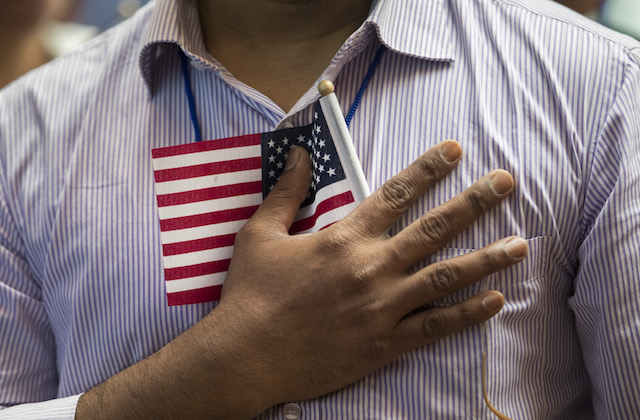Trump Administration Plans to Restrict Green Cards For Immigrants Enrolled in Safety Net Programs

The Trump administration wants to restrict green cards for immigrants who have participated in public assistance programs under new rules unveiled by the Department of Homeland Security on Saturday (September 22).
For over a century, federal law has excluded immigrants who could be deemed to be potentially dependent on financial assistance, and thus a "public charge," from obtaining legal residency. A new 447-page proposal expands on this definition by denying green cards to immigrants if they or members of their households receive federal benefits including Medicaid, the Medicare Part D low-income subsidy, Section 8 housing vouchers and the Supplemental and Nutritional Assistance Program (SNAP).
The rule would consider immigrants' use of public assistance as a "heavily weighed negative factor" that would make them "ineligible for change of status and extension of stay," the DHS announced over the weekend. The public charge inadmissability would factor in participation in the programs before or after the rule's enactment along with a "totality of the circumstances," including age, health, family and financial status, skills and education.
“Under long-standing federal law, those seeking to immigrate to the United States must show they can support themselves financially,” Homeland Security Secretary Kirtsjen Nielsen said in Saturday's statement. “This proposed rule will implement a law passed by Congress intended to promote immigrant self-sufficiency and protect finite resources by ensuring that they are not likely to become burdens on American taxpayers.”
The proposal would affect individuals who seek admission into the United States or apply for residency status, though it would not be applied to certain categories of immigrants, such as refugees, asylees or Afghanis and Iraqis with special immigrant visas.
According to The Washington Post, the Trump administration has spent months drafting the proposal to deny legal residency for immigrants who receive any form of welfare or public benefits as an attempt to curb immigration and appeal to groups who say that immigrants are draining the nation's economy.
Per The Post, the foreign-born population uses public services at approximately the same rate as native-born Americans:
Out of the 41.5 million immigrants living in the United States, 3.7 percent received cash benefits in 2013, and 22.7 percent accepted noncash benefits including Medicaid, housing subsidies or home heating assistance, according to statistics compiled by U.S. Citizenship and Immigration Services.
The percentages of native-born Americans who get the same forms of assistance are nearly identical. In 2015, 3.4 percent of 270 million nonimmigrant Americans received cash welfare payments, USCIS research found, and 22.1 percent received noncash subsidies.
Several immigration rights activists noted the racist history behind the public charge provision and how the new proposed iteration would affect millions of immigrants who may be forced to choose between participating in safety net programs and staying in the country.
"Public charge has a sordid history. It was abused in the past to keep out Jews fleeing Nazi Germany, Irish Catholics, LGBTQ people, people with disabilities and unmarried women, among others" Neera Tanden, president of the Center for American Progress, said in a statement.
More than 600 organizations, including Colorlines' publisher Race Forward, have opposed the proposal in a letter helmed by the Protecting Immigrant Families, Advancing Our Future campaign, saying:
Immigrants who come to the United States through a family-based petition are overwhelmingly immigrants of color. The administration’s choice to target family-based immigrants will worsen disparities in health, hunger and every other social malady.
[...]
The proposed changes would put whole families at risk if an immigrant relative seeks access to virtually any public service. With about one in four children having at least one immigrant parent, this issue touches millions and is critical now and for our nation’s future.
The DHS says that the proposed rule will be officially published in the Federal Register in the coming weeks. The public will then be given 60 days to comment on the proposed rule.
